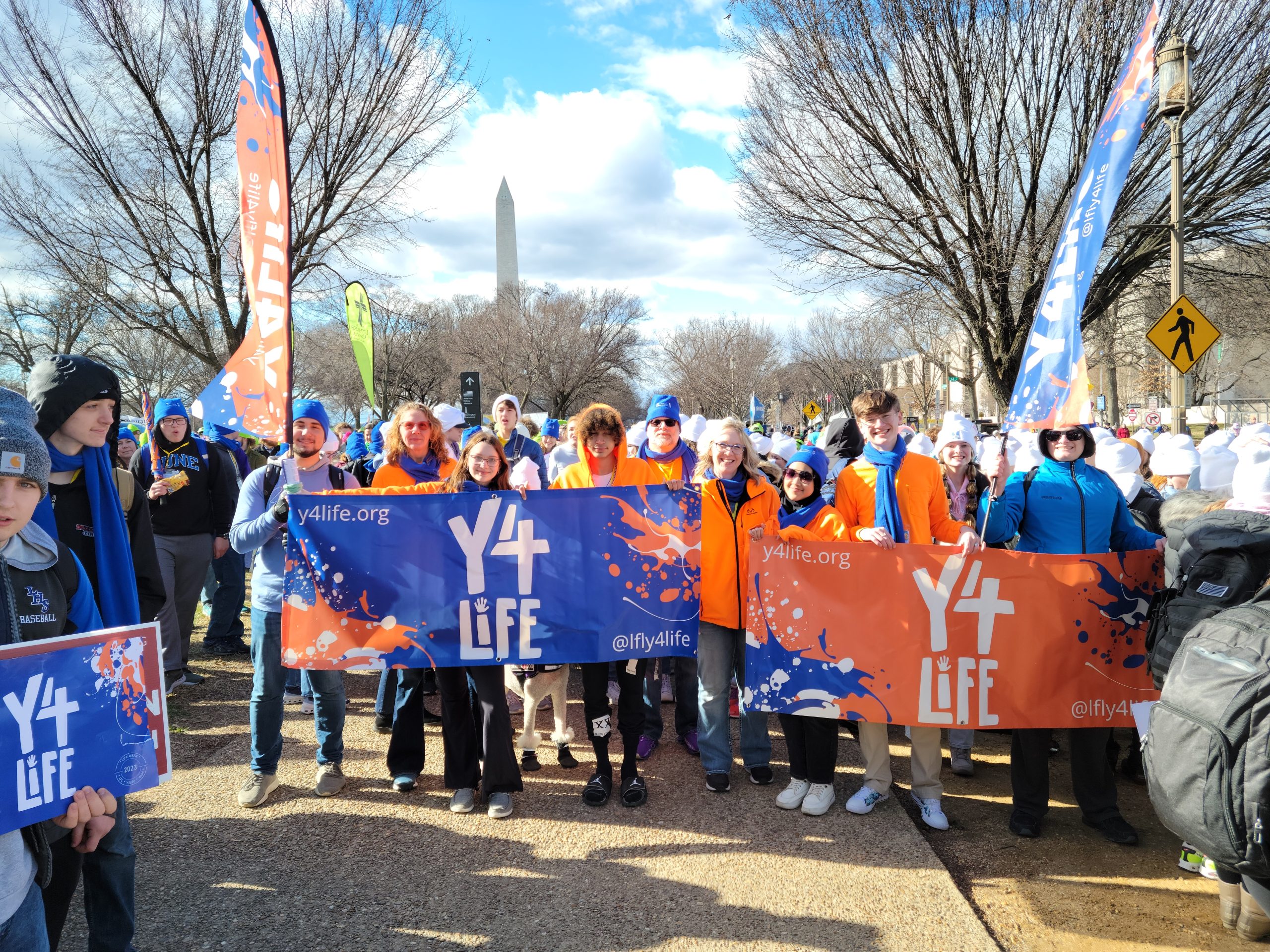
by Michelle Bauman, Director of Y4Life
It had been a big week—one full of wonderful opportunities to share a Gospel-motivated message about life—and I was exhausted.
After months of planning and preparation for Life Week 2023 and Y4Life in Washington, D.C., both events had come to an end. And what an end it was! With almost 400 participants gathered to celebrate, learn, and march in the national March for Life, the Y4Life in Washington, D.C., conference had been a mountaintop experience for many youth, and, if I was being honest, it had been for me, too.
Now it was all over. We had gathered, learned, and marched. The online presentations had been uploaded, and the in-person conference was complete. We had cleaned up the conference room, packed and repacked our boxes and bags, and returned the rental equipment. Even the van carrying items back to Iowa was on its way. The only thing left for me to do? Fly home.
I was looking forward to flying home, looking forward to solitude, reflection, and rest. And with the plane half-empty, I was sure to get it. After boarding, I found my row, snuggled into my window seat, and gazed out over the wing as the last bags were loaded. When a young man sat down next to me, I smiled and greeted him politely and then looked out the window again. On flights this empty, I knew he wouldn’t be my seatmate for long. He’d move—stretch out—and enjoy a row to himself.
So, it surprised me when he asked why I was headed to Indiana. I told him it was my home and soon learned we had much in common. We had both been in D.C. for a conference, both resided in southern Indiana, and both worked with youth for a living.
And then he asked THE question, the one that nine times out of ten not only ends the conversation but also makes my seatmate uncomfortable enough to want to move to a new seat: “So, what do you do for a living?”
I didn’t even try to soften the blow: “I’m the Director of Y4Life with Lutherans For Life, which means I work with high school and college youth across the nation to help them become Gospel-motivated voices For Life. I also help them start Y4Life teams in their schools and communities so that they can share with others the message that every life is valuable,” I said.
He paused, folded his hands, and looked at his lap. I was certain I’d have the row to myself within moments.
But I was wrong.
Not only did he want to know about the topics we’d covered at the conference and how each of those topics was a life issue, but he also wanted to know about other life issues—issues like dating and cohabitation, physician-assisted suicide and euthanasia, loneliness and depression, marriage and family. From taxi and take-off all the way through landing in Indy, we talked about life issues. We covered the order of creation and the gift of children; we discussed gender identity, homosexuality, and contraceptives. We even tackled racism and ableism, abortion and identity.
Through our conversation, my seatmate recognized the uniqueness of the Gospel-motivated voice: “I really like your approach,” he said about halfway through our flight. “You’re not anti-abortion; instead, you’re for life.” And when I once again connected the For Life perspective back to God’s For Life work, he asked an even better question, “What should I look for in a church?”
Life work. At its root, it’s about upholding lives and connecting them to Christ. Why? Because the Gospel is the most life-affirming message there is. In Christ the gifts of life reside. It was the same for God’s people centuries ago, and it is the same for us today. God was and is and always will be the source of life.
The Bible testifies to this truth again and again. Deuteronomy 30:19-20 reminds us of the life He promises when we remain in Him: “I call heaven and earth to witness against you today, that I have set before you life and death, blessing and curse. Therefore choose life, that you and your offspring may live, loving the Lord your God, obeying his voice and holding fast to him for He is your life and length of days ….”
Since the Dobbs ruling, many in the life arena have continued to contemplate the next step for the life movement. And most, if not all, of their ideas are good ones. But I’d suggest that fundamentally, our next step hasn’t really changed. Our next step has always been relational. It’s always been to change hearts and minds by upholding lives one person at a time.
For the Christian, changing hearts and minds isn’t just about meeting bodily needs; it also means connecting our neighbor to the true source of life—Christ Himself. It means providing for her needs in this world and the next by boldly intertwining our works and words of mercy with the gift of mercy Himself. It means helping him carry the crosses of this world on the way to his heavenly home.
As we live out our vocations—civic and familial—we can be certain that we will have the opportunity to change minds and uphold lives—in our homes, our places of work, our churches, and our communities. And sometimes, we even have the opportunity on airplanes. May God make us ready for those moments. May He give us the eyes to see them and the words to say. And may He ignite in us the courage to speak, even when it’s uncomfortable, so that others might come to have LIFE in Him.